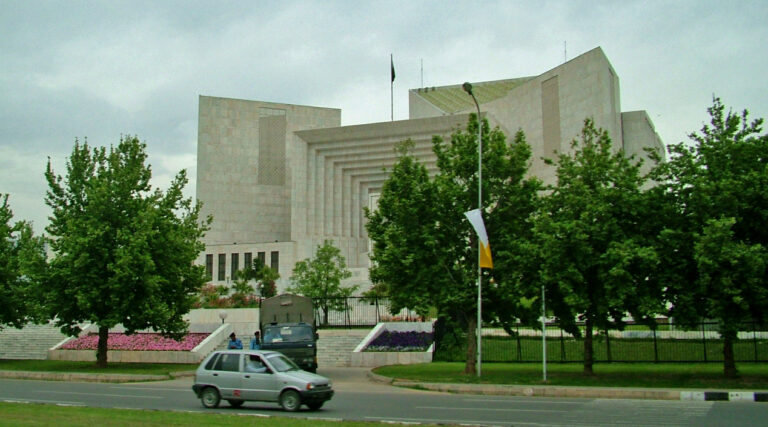
Are Christians the Most Persecuted Religious Group Worldwide?
Miray Philips
Church of St. John at Kaneo, Ohrid by Kallerna (CC BY-SA 4.0).
The perception that Christianity is under attack has long animated American political culture. Conservative American Christians even claim that Christians are the most persecuted religious group worldwide. Vice President J.D. Vance recently tweeted that, “All over the world, Christians are the most persecuted religious group.” Presidents, government officials, and congress members have repeated this common wisdom, shaping domestic and foreign policy debates on immigration, foreign aid, and presidential elections. This belief is so entrenched in American culture that Christian persecution is the subject of a proliferation of books and movies.
Religious and political actors cite quantified data—particularly by the Pew Research Center on religious restrictions and Open Doors on Christian persecution—to claim that Christians are the most persecuted religious group worldwide.
Yet neither data source substantiates this claim.
Open Doors is a Christian missionary organization that collects data on Christian persecution globally. They publish an annual rank list of the top 50 countries “where it’s most difficult to follow Jesus” as well as the number of Christians living in countries at risk of high levels of persecution. In 2025, 380 million Christians face very high or extreme levels of persecution. This number is the total population of Christians in countries facing high or extreme levels of persecution, not the actual number of people who have documented experiences of persecution. The list typically includes countries with large populations of Christians, such as India, China, and Nigeria, accounting for the large number of persecuted Christians.
Since Open Doors only collects data on Christians, however, it does not support claims that establish a hierarchy of suffering between religious groups. The absence of comparative data on the persecution of other religious groups renders it impossible to compare their suffering.
The Pew Research Center remains the dominant source of data on religious restrictions among international religious freedom advocates in Washington, D.C. The Pew Research Center is a non-partisan research organization that collects data on restrictions on religion by analyzing government restrictions and social hostilities. They publish the total number of countries where each religious group experiences restrictions. In 2021, Christians experienced restrictions in 160 countries, followed by Muslims in 141 and Jews in 91 countries.
The Pew Research Center makes it clear that findings about how widespread restrictions are cannot be interpreted to mean that a certain group experiences the most persecution worldwide. They instead explain this by pointing out that Christians are the largest population worldwide and are geographically dispersed globally.
Nevertheless, politicians inaccurately leverage quantified data to make claims about Christian persecution. At the first World Summit in Defense of Persecuted Christians in 2017, organized by the Billy Graham Evangelistic Association in Washington, DC, Vice President Mike Pence declared that “throughout the world, no people of faith today face greater hostility or hatred than the followers of Christ.” To support his claim, he cited Open Doors 2018 data that “over 215 million Christians confront intimidation, imprisonment, forced conversion, abuse, assault, or worse, for holding to the truths of the Gospel.”
The problem is compounded by a lack of consistency and clarity about what exactly is being measured. Christian persecution, religious freedom, and religious restrictions are all used interchangeably, despite meaning and measuring different social phenomena. Notably, persecution is a vague and evocative term. It does not identify the perpetrator nor clarify the nature of injury, but instead characterizes a group of people as victims. While it is imbued with religious connotations, persecution has no singular legal or academic definition. Persecution is effective in mobilizing those who care about the suffering of Christians while obscuring conceptual and empirical clarity.
While stories and images are central to persecution narratives, numbers are particularly effective because they offer an illusion of scientific objectivity and ideological neutrality. They allow politicians and advocates to assert that Christian persecution is an objective social problem that demands policy intervention, not merely a product of bias and favoritism.
In a recent post penned by David Trimble, the President of the Religious Freedom Institute, about Open Doors’ 2025 findings, he concludes by caveating that attention to Christian persecution should neither fall into polarizing partisan politics nor overshadow the persecution of other religious groups:
Given our intensely polarized age, I want to emphasize that the global scourge of Christian persecution must not get mired in partisan politics. The problem is simply too big and too dire […] It must also be said that recognizing and responding to the widespread suffering of Christians at the hands of oppressive governments and violent non-state actors in no way denies the unjust violence and repression perpetrated against Jews, Muslims, and other religious communities and the imperative to act in their defense.
Despite articulations of ideological neutrality, the United States has prioritized Christian persecution in its policies. Sounding the alarm on Christian persecution, for example, Representative Riley Moore [R-WV] recently introduced H.Res.594 condemning the persecution of Christians in Muslim-majority countries. The resolution begins by quoting Open Doors’ 2025 World Watch List that 380 million Christians worldwide are suffering because of their faith. The misinterpretation of data on religious persecution further entrenches religious freedom in polarizing partisan politics.
Claims about the gravity of Christian persecution are leveraged by conservative Christians domestically. They decry Christian persecution in legal battles and culture wars over abortion, contraceptives, taxes, and LGBTQ rights. The prioritization of Christian religious freedom by the religious right has polarized the cause, to the point that some Americans even perceive politicians sounding concern over anti-Christian bias as a racial dog whistle for supporting white power politics. Over the past several years, many of President Trump’s executive orders and initiatives privilege a Judeo-Christian approach to religious freedom, prioritizing the rights of Christians over gender and sexual minorities, as well as other religious and non-religious groups. His latest executive order to establish a taskforce to eradicate anti-Christian bias is viewed by some as the latest boost in Christian nationalism. Trump has also pandered to his right-wing Christian base—many of whom are evangelicals and already have a persecution complex—by talking about political persecution.
It is true that Christians are suffering egregious forms of violence globally and this warrants political attention and moral outrage. Yet the polarization of religious freedom does not help suffering Christians. Instead, it entrenches them into American culture wars, turning them into symbols of partisan politics and right-wing agendas. Despite quantification’s illusion of scientific objectivity and its utility in establishing policy priorities, claiming that Christians are the most persecuted religious group based on a misinterpretation of data does little in understanding the plight of Christians and other religious groups who are suffering globally because of their faith. ♦

Miray Philips is an Assistant Professor in Sociology at the University of Toronto. She is an expert in religion and human rights, specifically focusing on religious difference and religious freedom in the United States and the Middle East. This essay is based on an open access peer-reviewed article published in the Sociology of Religion journal and supported by both Bridging the Gap as well as the Social Science Research Council’s Religion, Spirituality, and Democratic Renewal program.
Recommended Citation
Philips, Miray. “Are Christians the Most Persecuted Religious Group Worldwide?” Canopy Forum, September 11, 2025. https://canopyforum.org/2025/09/11/are-christians-the-most-persecuted-religious-group-worldwide/.
Recent Posts










